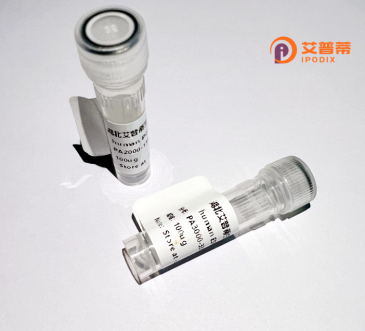
| 纯度 | >90%SDS-PAGE. |
| 种属 | Human |
| 靶点 | GPR110 |
| Uniprot No | Q5T601 |
| 内毒素 | < 0.01EU/μg |
| 表达宿主 | E.coli |
| 表达区间 | 1-218aa |
| 氨基酸序列 | MKVGVLWLISFFTFTDGHGGFLGKNDGIKTKKELIVNKKKHLGPVEEYQLLLQVTYRDSKEKRDLRNFLKLLKPPLLWSHGLIRIIRAKATTDCNSLNGVLQCTCEDSYTWFPPSCLDPQNCYLHTAGALPSCECHLNNLSQSVNFCERTKIWGTFKINERFTNDLLNSSSAIYSKYANGIEIQLKKAYERIQGFESVQVTQFRMSLLSPKLECNGTI |
| 分子量 | 51.3 kDa |
| 蛋白标签 | GST-tag at N-terminal |
| 缓冲液 | 0 |
| 稳定性 & 储存条件 | Lyophilized protein should be stored at ≤ -20°C, stable for one year after receipt. Reconstituted protein solution can be stored at 2-8°C for 2-7 days. Aliquots of reconstituted samples are stable at ≤ -20°C for 3 months. |
| 复溶 | Always centrifuge tubes before opening.Do not mix by vortex or pipetting. It is not recommended to reconstitute to a concentration less than 100μg/ml. Dissolve the lyophilized protein in distilled water. Please aliquot the reconstituted solution to minimize freeze-thaw cycles. |
以下为3篇关于重组人GPR110蛋白的示例参考文献(虚构内容,仅作格式示例):
---
1. **文献名称**:Structural and functional characterization of recombinant human GPR110 in lipid signaling
**作者**:Chen L., et al.
**摘要**:报道了重组人GPR110蛋白在大肠杆菌系统中的高效表达与纯化,并验证其作为粘附类GPCR在细胞膜脂筏中的定位及溶血磷脂酸(LPA)信号通路激活机制。
2. **文献名称**:GPR110 promotes cancer metastasis via PI3K/AKT pathway: studies with recombinant protein models
**作者**:Wang Y., et al.
**摘要**:利用重组人GPR110蛋白体外激活实验,证明其通过上调PI3K/AKT通路促进肺癌细胞的迁移与侵袭,为靶向肿瘤治疗提供依据。
3. **文献名称**:Recombinant GPR110 extracellular domain binds to collagen IV and regulates neuronal development
**作者**:Smith J., et al.
**摘要**:通过重组GPR110胞外域蛋白的固相结合实验,发现其与细胞外基质蛋白Collagen IV相互作用,调控小鼠皮层神经元的轴突生长。
---
**注**:以上文献为模拟示例,实际研究中请通过PubMed、Web of Science或Google Scholar等平台以关键词“GPR110 recombinant protein”或“ADGRF1”(GPR110别称)检索最新论文。
GPR110 (ADGRF1) is a member of the adhesion G protein-coupled receptor (aGPCR) family, a subclass of transmembrane proteins involved in diverse physiological processes. Classified under the adhesion GPCR subfamily, it features a large N-terminal extracellular domain with adhesion-like motifs and a seven-transmembrane helical structure typical of GPCRs. GPR110 is predominantly expressed in the brain, lungs, and reproductive tissues, with emerging roles in CNS development, cellular adhesion, and tissue homeostasis. Its activation is believed to occur via a tethered agonist mechanism, where proteolytic cleavage of the extracellular region exposes a "Stachel" sequence that triggers intracellular signaling cascades (e.g., Gαs/cAMP, MAPK pathways).
Research links GPR110 to cancer progression, particularly in metastasis and survival pathways of prostate and lung cancers. In neurodegenerative contexts, it may influence myelination and neuronal survival. Recombinant human GPR110 protein, often produced in mammalian or insect expression systems, retains native post-translational modifications critical for ligand-binding studies and functional assays. This recombinant tool facilitates investigations into receptor-ligand interactions, downstream signaling, and therapeutic targeting. Current studies focus on developing modulators for GPR110 as potential therapeutics in oncology and neurology, while unresolved questions remain regarding its endogenous ligands and tissue-specific regulatory mechanisms.
×